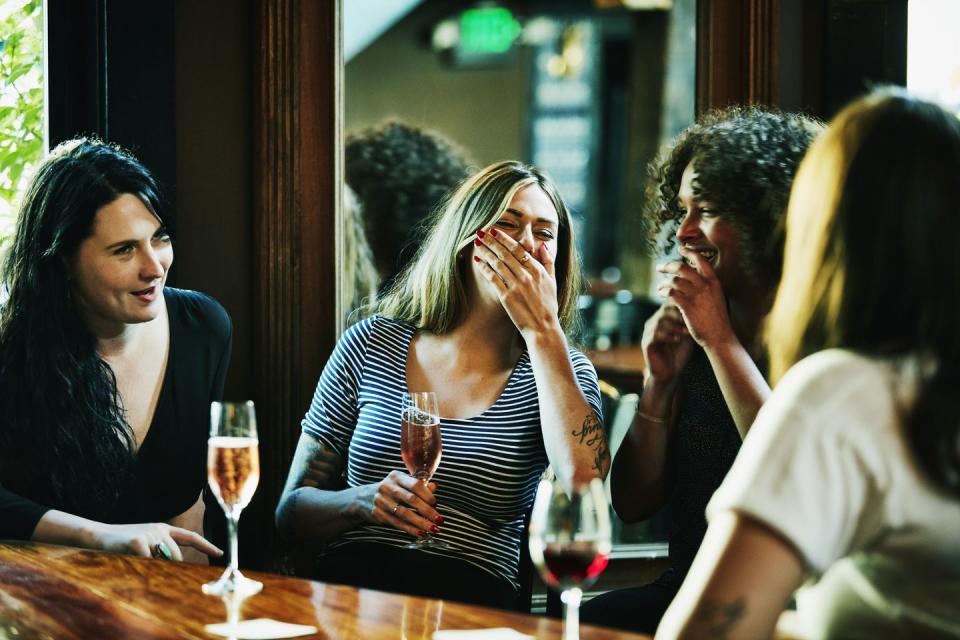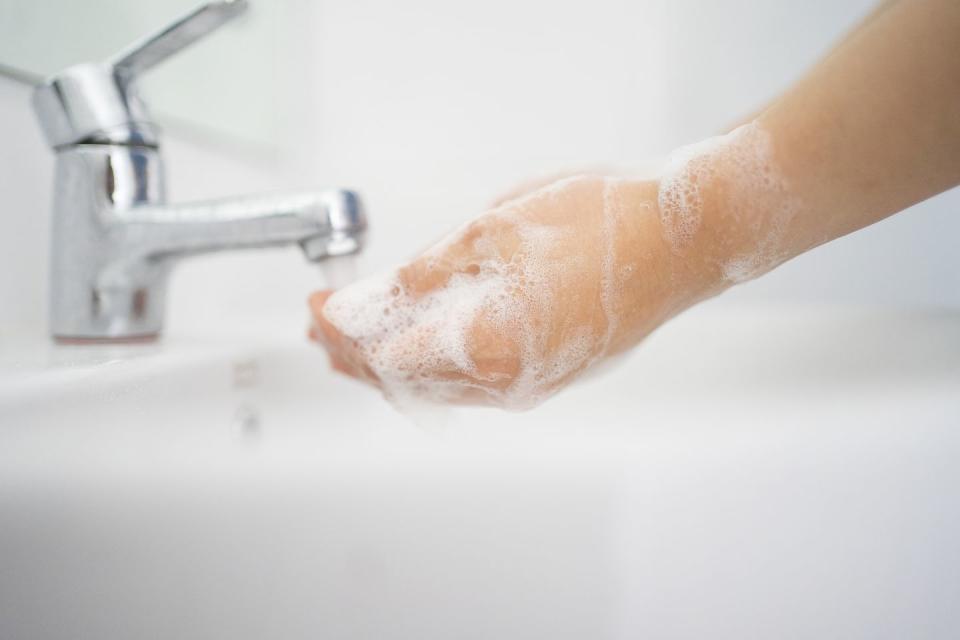'I'm a 42-year-old woman who got the new coronavirus. This has been the hardest part.'

This article has been medically reviewed by Keri Peterson, MD, Internal Medicine, Mount Sinai Hospital.
On Friday, March 6, I was sitting in my living room when I got the voicemail message that just said, "Call me back," in an urgent tone. That's when I knew that I had tested positive for the new coronavirus, aka COVID-19. I’m fine now, mostly, a little short of breath with an occasional cough, but it's been... an experience.
Here’s how everything happened: On Tuesday, February 25, I was at a lunch with seven people at a restaurant, which is where I suspect I caught the virus. I later learned that one person was infected, although I didn't notice her showing any symptoms yet. I, along with two other people, were sick by that Friday. They told me that their symptoms were very mild and that they only had a brief fever. For me, it was a little worse.

On Friday, February 28, I woke up with a sore throat and headache. I work from home, and by noon I felt so under the weather that I had to stop working. By 2 p.m., I had chills and body aches and a mild fever of 100.2°F that was gone within a half hour after I took ibuprofen. By 3 p.m., I was in bed and stayed there well into the next day. Initially, I thought it was the flu.
I live near Seattle, US, and the day I got sick, I learned that someone in the area had gotten COVID-19. I also read that they had no connection to anyone in an affected country overseas, and so their case was suspected to have been caused by transmission from someone else in the community. On Saturday, February 29, I went to a clinic near my home and had my temperature taken again (100.5°F). The nurse I saw gave me Tamiflu, an antiviral for the flu.
At that point, the new coronavirus was on my mind.
I got home and called the consulting nurse from the clinic again and asked if I could get tested for COVID-19.
I was really worried, but she told me I didn’t meet the criteria for testing.
At that time, you had to have had contact with someone under investigation for the disease or who had traveled to China recently. She told me that if I wanted to be specifically tested for the flu, I could go to urgent care. She didn’t recommend going there, though—they were really crowded with other people with the flu, and I’d risk either infecting others or being exposed to viruses that others had. So I stayed home.
The nurse also suggested that I enrol online in the Seattle Flu Study.
It’s a research project, and if you qualify, they send you a kit, ask you to swab your nose, and mail it back to them. (There have since been reports that they'd begun testing samples for COVID-19 against federal guidelines.) I'm not sure if the nurse knew I’d get tested for new coronavirus by enrolling in the study, but I'm grateful that she pointed me in that direction.
Within two hours, the delivery guy was at my door with a swab kit. It was a Saturday, so I didn’t mail the sample back until Monday, March 2.
On Friday, March 6, I received that fateful voicemail from the public health department.
The way the woman said, “Call me back,” I just knew something was up. When we connected over the phone, she told me that I had tested positive for COVID-19.
The woman who delivered the news to me was amazing. She was calm, asked me about who I’d been in contact with, and talked to me about quarantining. I was instructed to quarantine until 72 hours after my fever was gone, or seven days after my first symptoms—whichever came later. By that time, I had been self-quarantining already for a week. I’m a copy editor, so I always work from home and could continue to when I felt well enough to do so.

I have a husband and two children who are 7 and 10, and luckily, they haven’t caught it. Novel coronavirus was a big unknown when I got my test results (and still is on many counts), so I really isolated myself from everyone by staying in my bedroom for the first 72 hours I was sick. In retrospect, I think this made a difference in lowering their risk of catching it.
Still, the health department suggested my family go under self-quarantine for 14 days so that we could monitor them and see if they developed any symptoms themselves. This means they don’t leave the house. My quarantine is over, but I still haven’t gone out, partly because I feel the science on how long the novel coronavirus may be contagious is up in the air on this.
My husband tested negative a couple of days ago, and my kids won’t be tested unless they have symptoms.
I’m still not kissing or hugging them, and that’s hard. We have Clorox wiping-down parties as a family. My 7-year-old daughter loves to do this, as she's been wiping down all the doorknobs and handles and the bathroom sink as part of her weekly chores since she was age six. I’d like to think maybe this contributed in some small way to containing the virus in our household.

Truthfully, for me the illness hasn’t been that bad. A couple of years ago, I got the flu and found that to be worse. Being sick with COVID-19 felt different because I experienced shortness of breath, which is what tipped me off to the fact that I might have it. It was like I could still breathe but I couldn’t get a full breath, which felt a little scary. I’m typically a healthy person who always recovers easily from illness. It’s been almost two weeks now, and I’m just getting over it, which is similar to the experience I've had with any cold or flu.
What’s been hard for me is personally notifying everyone I can think of who I might’ve had contact with.
I’ve been on the phone for hours. It was difficult to know that I was disrupting and upending people’s lives. But they’ve been so gracious and have thanked me for telling them. That experience was more stressful than I realised it would be—and was honestly tougher than the illness itself.
Although my community has been amazing and incredibly supportive—there have been so many people who have asked if we needed any groceries or supplies dropped off for us—I realise there is still a lot of fear and stigma associated with COVID-19, which is why I've decided to remain anonymous in this piece.
For me, having the novel coronavirus has been manageable, but I realise that hasn't been everyone's experience.
I am most concerned for the people whose health is already compromised in some way, and it’s for them that we all need to take the measures we can to contain this virus as quickly as possible. I hope you’ll also consider not attending any events, especially if you’ve had any fever or symptoms. We all need to do what we can to keep others safe.
You Might Also Like

